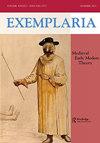The historian and her past
IF 0.3
4区 历史学
0 MEDIEVAL & RENAISSANCE STUDIES
引用次数: 0
历史学家和她的过去
本文章由计算机程序翻译,如有差异,请以英文原文为准。
求助全文
约1分钟内获得全文
求助全文
来源期刊

Exemplaria-Medieval Early Modern Theory
MEDIEVAL & RENAISSANCE STUDIES-
CiteScore
0.40
自引率
0.00%
发文量
8
期刊介绍:
The first issue of Exemplaria, with an article by Jacques Le Goff, was published in 1989. Since then the journal has established itself as one of the most consistently interesting and challenging periodicals devoted to Medieval and Renaissance studies. Providing a forum for different terminologies and different approaches, it has included symposia and special issues on teaching Chaucer, women, history and literature, rhetoric, medieval noise, and Jewish medieval studies and literary theory. The Times Literary Supplement recently included a review of Exemplaria and said that "it breaks into new territory, while never compromising on scholarly quality".
 求助内容:
求助内容: 应助结果提醒方式:
应助结果提醒方式:


